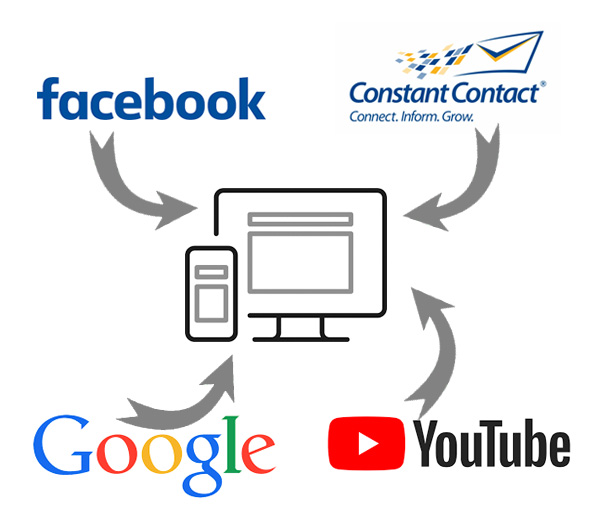
All the online marketing your business does should lead back to your website. It is the center of not only your online marketing but often all your marketing.
Here’s all the other online marketing tools you should be using, and how to direct them back to your website:
1. Facebook and other social media
Not every Facebook post has to link back to your website. Sometimes you’re just trying to keep up interest, or build up your followers, or share information with your fans. But ultimately, you want to create leads. Maybe you would rather your leads call or text you, which is fine…but other times you want to setup a sales funnel with your website.
Create Facebook posts that peak interest in a promotion you are offering, and then link back to your website for more information, or to register, or to donate, etc.
2. Email newsletters
An email newsletter by itself is limited. We recommend putting articles, blog posts, promotions, and events on an email newsletter, but always link it back to your website. You can track who clicks on it and who is really interested. Plus you don’t want to include too much information on an email newsletter or it will be to crowded.
3. YouTube
Using video online is very powerful. It can be expensive and/or time consuming to produce good content, but the payout can be very beneficial. Include a link to your website in the description of the video, or mention at the end of the video that you want your users to visit your website (as well as subscribe to your channel).
4. Pay-per-click ads
Typically, your website is the destination of an online paid ad. Crafting the landing page for that ad is extremely important. Only your website has the flexibility to produce an effective sales funnel for your potential customers.
Could other platforms be the hub instead of a website? Maybe. But we don’t think they would be as effective. Here’s why:
You Can Put Any Content On It
A website can hold any kind of information. Whether it’s videos, pdfs, pictures, text, etc…it can hold it all. It’s a one stop shop for any kind of material you want to promote. That kind of flexibility makes it very powerful compared to other platforms. YouTube is great, but it only does videos. Instagram is good for mostly just pictures and video. An email newsletter has a limited amount of space.
Your Information is Easy to Find
Facebook is great for sharing information, but unless it’s recent, it’s not easy to locate. With your website, you can organize the important items in such a way that you can ensure that your users notice them in the order you want them to.
Much Better Search Engine Optimization
A website is always easier to find than a Facebook page or anything else. If customers are looking for you online, you want to make sure they find you and not a random Yellow Pages directory. That isn’t really what they’re looking for. A strong website will dominate the search results for people who look for you by your company name particularly, which is very important.
No Limits
There are no limits to the amount of content you can put on your website. If you have an archive of pictures, or old blog posts, or whatever, you can include it all on your website. And when you also organize it properly, it doesn’t distract your users from the rest of your website.

